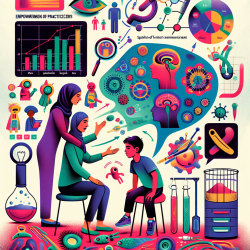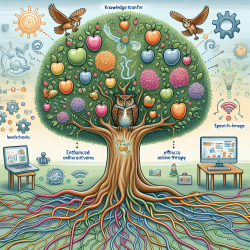Introduction
The COVID-19 pandemic has presented numerous challenges across various fields, including science education. The research article "Undergraduate behavioral biologists keep science careers in focus through pandemic challenges—but need support" provides valuable insights into how the pandemic has affected undergraduate science concentrators. This blog aims to translate these findings into actionable strategies for practitioners, particularly those involved in online therapy services like TinyEYE, to enhance their skills and improve outcomes for children.
Understanding the Challenges
The pandemic has disrupted traditional educational settings, leading to pedagogical disadvantages, technical issues, and reduced opportunities for peer interaction. These challenges are compounded by a societal atmosphere that often undermines the importance of science. As practitioners, understanding these dynamics is crucial in tailoring our approaches to meet the evolving needs of students and clients.
Implementing Research Outcomes
Based on the research findings, practitioners can adopt the following strategies to improve their skills and support their clients:
- Embrace Flexibility: The pandemic has necessitated a shift to remote learning and therapy. Practitioners should be flexible in their approaches, adapting to new technologies and methods to deliver effective therapy sessions.
- Enhance Communication: Clear and open communication with clients and their families is essential. This includes setting expectations, providing regular updates, and being receptive to feedback.
- Promote Emotional Well-being: Acknowledge the emotional challenges faced by clients and offer support. Incorporating mindfulness and stress-reduction techniques into therapy sessions can be beneficial.
- Foster a Supportive Environment: Create an inclusive and supportive atmosphere that encourages engagement and participation. This can help mitigate the feelings of isolation that many students experience during remote learning.
Encouraging Further Research
While the current research provides valuable insights, there is always room for further exploration. Practitioners are encouraged to stay informed about the latest developments in their field and consider conducting their own research to address specific challenges they encounter in their practice. Collaboration with academic institutions and participation in professional networks can facilitate access to resources and support.
Conclusion
The pandemic has undoubtedly tested the resilience and adaptability of practitioners in the field of speech-language pathology and beyond. By implementing the strategies outlined in the research, practitioners can enhance their skills and contribute to positive outcomes for their clients. Continuous learning and adaptation are key to navigating the challenges posed by the pandemic and ensuring the success of online therapy services.
To read the original research paper, please follow this link: Undergraduate behavioral biologists keep science careers in focus through pandemic challenges—but need support.










